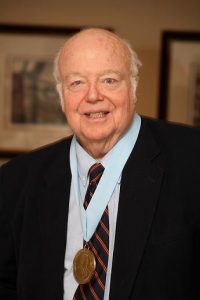2006 Thomas Wolfe Prize: George Garrett
 George Garrett, recipient of the 2006 Thomas Wolfe Prize, was honored earlier than planned. He was to visit Chapel Hill in the fall, receive his medal, and present the annual Thomas Wolfe Lecture. However, medical issues thwarted his plans to travel to Chapel Hill. Therefore, a Carolina delegation delivered the prize to Mr. Garrett in his home town of Charlottesville, Virginia. The delegation from Carolina included Bland Simpson, writer and Director of the Creative Writing Program; Michael McFee, poet and Interim Director of the Creative Writing Program; Pam Durban, writer and Doris Betts Professor of Creative Writing; Michael Chitwood, poet and Creative Writing instructor; and Alice Cotten, representative of the Thomas Wolfe Society.
George Garrett, recipient of the 2006 Thomas Wolfe Prize, was honored earlier than planned. He was to visit Chapel Hill in the fall, receive his medal, and present the annual Thomas Wolfe Lecture. However, medical issues thwarted his plans to travel to Chapel Hill. Therefore, a Carolina delegation delivered the prize to Mr. Garrett in his home town of Charlottesville, Virginia. The delegation from Carolina included Bland Simpson, writer and Director of the Creative Writing Program; Michael McFee, poet and Interim Director of the Creative Writing Program; Pam Durban, writer and Doris Betts Professor of Creative Writing; Michael Chitwood, poet and Creative Writing instructor; and Alice Cotten, representative of the Thomas Wolfe Society.
On August 8 the group drove to Charlottesville and presented Mr. Garrett with the medal at a festive luncheon, which included Garrett’s wife and son, former Kenan poet Thorpe Moeckel and his Hollins colleague Richard Dillard, two directors of Virginia humanities programs, an editor at the Virginia Quarterly Review, two faculty members in the UVA MFA program, and two former Carolina Honors students now studying in that program, Joe Chapman and Julia Hansen. All guests were there out of admiration and affection for George Garrett. He clearly felt honored to receive the Prize and appreciated the celebratory occasion. When his health improves, he plans to write a piece about Thomas Wolfe.
George Garrett has “influenced more writers than Faulkner.” So proclaims novelist Madison Smartt Bell and while that proclamation might raise a few eyebrows among the apostles of Saint William if one looks at the incredibly varied career of Mr. Garrett it is easy to see how the case can be made.
Editor, translator, dramatist/scriptwriter, Virginia Poet laureate, award-winning fiction writer, adored teacher and mentor and wide-ranging reviewer and essayist, Garrett has been plying all these trades for more than five decades and his list of stellar books is matched only by his list of stellar students, who, like Bell, have gone on to successful writing careers of their own. The author of 32 volumes and editor of dozens more, Garrett may be best known for his historical trilogy of novels that explored Elizabethan intrigues and particularly the mind of Sir Walter Raleigh. Writer and professor R.H.W. Dillard has explained how an unabashed Southern writer like Garrett might come to such subject matter—and in his explanation perhaps gets at the essence of Garrett’s literary focus: “The South of Do, Lord, Remember Me is, like Chaucer’s England, a confused landscape in which religion and sex, honesty and petty evil, the haunting dream of purity and the fallen world of lies are so subtly interwoven that no one can judge another or even himself or herself, and in which the most serious of religious pilgrimages is at once an occasion for true religious feeling and unrestrained bawdiness.”
In novels such as Death of the Fox; Do, Lord, Remember Me; An Evening Performance and The King of Babylon Shall Not Come Against You as well as numerous volumes of poetry and nonfiction including his new and selected Days of Our Lives Lie in Fragments, Garrett has taken up the many occasions of human feelings in all their range and bawdiness.
Perhaps lauded most for his historical fiction, Garrett is a that rare thing–a true man of letters, writing poetry, scholarly critiques and even the screenplay for “Frankenstein Meets the Space Monster.” His career has seen many successes, both in publishing and in the classroom and was capped last year by the Library of Virginia’s Lifetime Achievement Award.
But whether grounding his work in his native South or setting it in outer space, Garrett has never strayed far from his real love, which is the telling of the tale. A celebrated raconteur, Garrett delights with story no matter the occasion, either across the dining table or on the page. What one of his characters says in his novel The King of Babylon Shall Not Come Against You rings strikingly true for the author himself: “And one of the things this old Judge was forever and a day saying was that our stories are who we are. Not that our stories reveal who we are in the fullest sense. And that that our stories can be translated, like something in a foreign language, like a foreign film with subtitles, into the simple clarity of a simple statement. But that our stores are who and what we are, nothing more or less.”
True in the book, true in the life. A master story-teller is exactly who and what George Garrett is.

